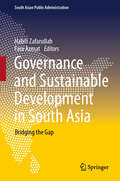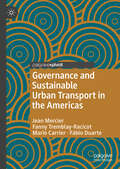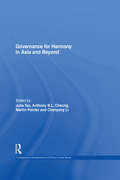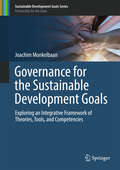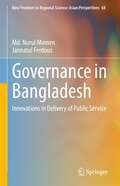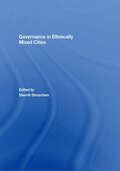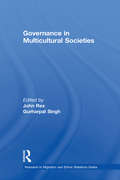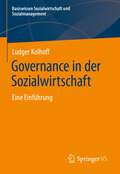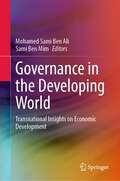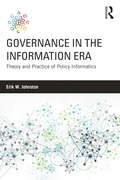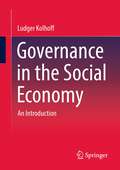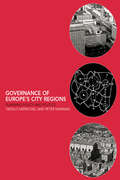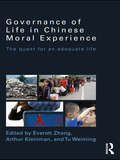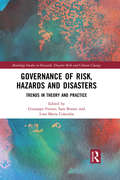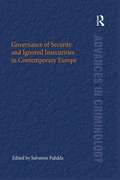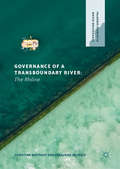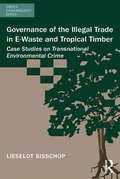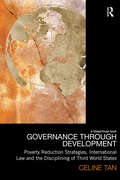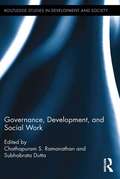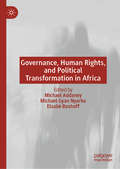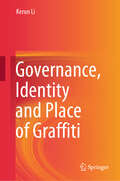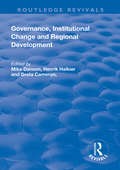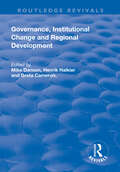- Table View
- List View
Governance and Sustainable Development in South Asia: Bridging the Gap (South Asian Public Administration)
by Habib Zafarullah Fara AzmatThis edited volume analyzes South Asian public administration and its role in development through the lens of SDG 16. Chapters explore how SDG 16 has influenced the development of effective and accountable public institutions and the initiatives taken within this region to promote an inclusive society, provide access to justice for all, and build effective, accountable, and inclusive institutions at all levels. Each case presented offers best practices, the challenges faced, and the opportunities SDG 16 provides for regional and national development, as well as valuable insights into the transfer of knowledge and learning within the South Asian region and for broader “South-South” and “South-North” exchange. The book is intended for policymakers, businesses, civil society organizations as well as academics across research fields spanning management, social innovation, and corporate sustainability, who are pursuing research on public administration, governance and the SDG Agenda.
Governance and Sustainable Urban Transport in the Americas
by Jean Mercier Fanny Tremblay-Racicot Mario Carrier Fábio DuarteThis volume explores the governance patterns of three cities of the Americas, Seattle, Montreal, and Curitiba, which all present different but interesting cases in dealing with sustainable urban transport challenges. The authors study empirical data from these three cities to analyze how specific governmental and policy instruments (planning, consultation and market mechanisms for example) were implemented in each case. Through concepts coming from policy studies and sociology, for example, such as path dependency, institutional culture and transaction costs, the three cities are also looked at in a broader perspective in order to better understand how they deal differently with their common challenges.
Governance for Harmony in Asia and Beyond (Comparative Development and Policy in Asia)
by Chenyang Li Anthony B. Cheung Julia Tao Martin PainterHarmony has become a major challenge for modern governance in the twenty-first century because of the multi-religious, multi-racial and multi-ethnic character of our increasingly globalized societies. Governments all over the world are facing growing pressure to integrate the many diverse elements and subcultures which make up modern pluralistic societies. This book examines the idea of harmony, and its place in politics and governance, both in theory and practice, in Asia, the West and elsewhere. It explores and analyses the meanings, mechanisms, dimensions and methodologies of harmony as a normative political ideal in both Western and Asian philosophical traditions. The book argues that in Western political thought - which sees politics as primarily concerned with resolving social conflicts and protecting individual rights - the concept of harmony has often been neglected. In contrast, since earliest times harmony or 'he' has been a profound theme in Confucian thought, and current leaders of many East Asian governments, and the Chinese government, have explicitly declared that the realisation of a harmonious society is their aim. The book also assesses how harmony is pursued, jeopardized or deformed in the real world of politics, based upon empirical analysis of a variety of different cultural, social and political contexts, including: China, Hong Kong, Singapore, Malaysia, Singapore, Vietnam, Denmark, Latin America and the Scandinavian countries. It shows how harmony as an organizing concept can help to promote new thinking in governance, and overcome problems of modern-day governance like distrust, adversarial conflicts, hyper-individualism, coercive state intervention, and free-market alienation. It also discusses the potential problems posed by the pursuit of harmony, in particular in the grave threat of totalitarianism, and considers how these risks could best be mitigated.
Governance for the Sustainable Development Goals: Exploring An Integrative Framework Of Theories, Tools, And Competencies (Sustainable Development Goals Series)
by Joachim MonkelbaanThis book provides a detailed overview of governance for the Sustainable Development Goals (SDGs). Adopting a unique integrative approach, it examines the fragmentation of governance that is a critical barrier to achieving the SDGs. The main question addressed is: What are the crucial elements and the organizing logic of an integrative framework that is suitable for analysing governance for the SDGs and for implementing the transitions that we need towards a more sustainable world?This transdisciplinary book first proposes a combination of innovative governance theories that can improve the analysis and practice of sustainability governance. Secondly, it explores the interests of core actors in a number of case examples. And thirdly, it offers recommendations for improving the study and practice of sustainability governance.The findings presented form the basis for a new approach to governance towards objectives such as the SDGs: Integrative Sustainability Governance (ISG). The ensuing ISG framework includes indicator frames within the pillars of power, knowledge and norms. The book concludes that the transformation of crisis into sustainability transitions requires a deeper consideration of risk management that strengthens resilience; systems deliberation that complements democracy; and behavioral insights that elevate human awareness and collaboration. This handbook is a comprehensive and valuable companion for students, experts and practitioners with an interest in the SDGs.
Governance grenzüberschreitender Professionalisierung und gesellschaftlicher Integration: Strategien und multiple Rationalitäten beim Aufbau eines kommunalen Bildungsmanagements (Educational Governance #57)
by Katharina LüthiIn diesem Open-Access-Buch wird den Fragen nachgegangen, wie der Akteur Kommunales Bildungsmanagement kollektive Handlungsfähigkeit herstellt und welchen Beitrag diese Koordinationsarbeit zur gesellschaftlichen Integration leistet. Die Rekonstruktion von Arenen, die in einem komplexen Geflecht von Integrationsräumen zusammenwirken, basiert auf Interviewdaten der wissenschaftlichen Begleitforschung zum Programm Lernen vor Ort. Ausgehend von dem Verständnis eines Theorie-Methodenpakets zwischen der interaktionistischen Handlungstheorie und der Grounded-Theory-Methodologie werden zentrale Herausforderungen der Governance-Forschung mithilfe der Zeigestruktur der Erziehung zu einer prozessbezogenen pädagogischen Organisationsforschung zusammengeführt.Dies ist ein Open-Access-Buch.
Governance in Bangladesh: Innovations in Delivery of Public Service (New Frontiers in Regional Science: Asian Perspectives #68)
by Md. Nurul Momen Jannatul FerdousThis book adopts the multidimensional nature of innovation as its point of focus and offers a comprehensive analysis of contemporary governance issues in Bangladesh. Each chapter views those issues from its own disciplinary perspective, but all share a common focus on the current process in the governance of innovation. The authors show how the processes of innovation and public service delivery are influenced while there is simultaneously a striving for a digital Bangladesh. The book presents innovation as a complex phenomenon with multidisciplinary viewpoints affecting its governance. As well, new practices, developments, and empirical research are shown here. The aim is to point out the most persistent difficulties in public administration and public service delivery, with an emphasis on how to deliver public service in Bangladesh in a sustainable manner. Although significant transformations have been made recently for a better organized public sphere, public services still must be more closely in line with what citizens need rather than what service providers are prepared to deliver. This published work speaks strongly to a wide-ranging audience, from scholars of governance and innovation management to academics, researchers, and postgraduate students interested in public service delivery innovations in Bangladesh and South Asia. Indeed, the book serves as a text and valuable resource for postgraduate courses in politics, business administration, economics, political science, development, and governance in South Asia.
Governance in Ethnically Mixed Cities (ISSN)
by Sherrill StroscheinThis collection of original essays breaks new ground by examining the dynamics of ethnic politics at the local level, rather than following in the footsteps of many previous studies which focus on the macropolitical level of states and nations. Governance in Ethnically Mixed Cities is based on extensive fieldwork and local observation, providing perspectives from a range of academic disciplines including Political Science, Geography, and Anthropology. It covers a variety of geographic areas from the Middle East (Kirkuk, Haifa, and Tel Aviv-Jaffa) to Europe (Mostar, Bolzano, Toulouse, and Florence), Central Asia (Osh in Kyrgyzstan) and the United States (Durham, North Carolina). In spite of the variety of disciplinary approaches and geographic diversity of the case studies, the contributing authors uncover a number of common elements of local ethnopolitical dynamics in mixed cities: the power of informal institutions, the effect of numerical balances between groups on local politics, and the significance of local competition for material and symbolic resources. Each of these areas provides a promising avenue for future research.
Governance in Multicultural Societies (Research in Migration and Ethnic Relations Series)
by Gurharpal SinghIn the last decade the study of multiculturalism has become an established field in political and social theory. This in-depth and engaging volume focuses on public policy and the dilemmas faced by the governments of increasingly diverse societies. Offering a theoretically and empirically rich collection of essays from some of the leading specialists in the field, it fills the gap between the social and political theory of multiculturalism and institutionally based national case studies. The book is distinctive in combining a robust theoretical introduction to recent developments in multiculturalism with a critical evaluation of contemporary public policy in a variety of countries in Europe, South Asia, Southeast Asia, the Far East and South Africa. It incorporates a strong comparative dimension both within and across the case studies, with a regional focus enabling comparisons of regional, national and international experience.
Governance in der Sozialwirtschaft: Eine Einführung (Basiswissen Sozialwirtschaft und Sozialmanagement)
by Ludger KolhoffIn diesem Lehrbuch werden Governance-Aspekte auf verschiedenen Ebenen verständlich dargestellt und erläutert: Nach einem Blick auf die wirtschafts- und politikwissenschaftlichen Wurzeln der Governance-Diskussion werden auf der Makroebene „Orders of Governance“ politische und ökonomische Aushandlungs- und Problemlösungsprozesse erörtert und institutionelle und normative Rahmenbedingungen betrachtet; auf der Mesoebene „Cooperation“ geht es um Formen der Steuerung und der Kontrolle sowie um die Kooperation und Koordination von sozialwirtschaftlichen Unternehmen; und auf der Mikroebene „Interactions“ wird Governance aus der Perspektive der Akteure und ihrer Interaktionen behandelt.
Governance in the Asia-Pacific
by David Goldblatt Richard Maidment Jeremy Mitchell]IGovernance in the Asia-Pacific is a student-friendly textbook which examines the governance of nation states in this diverse and rapidly-changing region. It sets out the range of political beliefs and styles that flourish and the similarities and differences between individual states and the ways in which they choose to govern. Wide-ranging in scope and clearly written to help students get to the bottom of important issues, the book addresses many key areas including:* the Anglo-American powers* Japan* independence movements* the politics of economic development* social movements* the politics of the environment* the pressures for political change in the region.And these issues are all analysed within the broad context of governance in the Asia-Pacific more generally. The authors also identify factors which explain the political underpinning of the dramatic economic development in the region.
Governance in the Developing World: Transnational Insights on Economic Development
by Mohamed Sami Ben Ali Sami Ben MimThis book assesses the extent to which good governance may contribute to enhancing economic performance and social welfare in developing countries, globally. Governance has been pointed out as one of the major weaknesses of developing economies and may largely be attributed to weak governance practices at both the macro- and micro-level. This book highlights the channels through which governance may act on various economic sectors and different key economic variables. In doing so, it enables policymakers to identify and implement policies and procedures to promote good governance. This book provides a transnational perspective on good governance in considering developing countries in Asia, Africa and beyond, presenting respective case studies in single country settings, enabling a comparative perspective between and across all chapters. Covering topics that include the intersection between governance and gender, inequality, poverty, education and health, the book provides diverse theoretical and empirical evidence on important issues facing policymakers, investors and other stakeholders and is relevant to graduate students and researchers interest in policy issues in the developing world.
Governance in the Information Era: Theory and Practice of Policy Informatics
by Erik W. JohnstonPolicy informatics is addressing governance challenges and their consequences, which span the seeming inability of governments to solve complex problems and the disaffection of people from their governments. Policy informatics seeks approaches that enable our governance systems to address increasingly complex challenges and to meet the rising expectations of people to be full participants in their communities. This book approaches these challenges by applying a combination of the latest American and European approaches in applying complex systems modeling, crowdsourcing, participatory platforms and citizen science to explore complex governance challenges in domains that include education, environment, and health.
Governance in the Social Economy: An Introduction
by Ludger KolhoffIn this textbook, governance aspects are presented and explained in a comprehensible way at different levels: After a look at the roots of the governance discussion in economics and political science, political and economic negotiation and problem-solving processes are discussed on the macro level "Orders of Governance" and institutional and normative framework conditions are considered; on the meso level "Cooperation", forms of steering and control as well as cooperation and coordination of social economy enterprises are dealt with; and on the micro level "Interactions", governance is dealt with from the perspective of the actors and their interactions.
Governance of Europe's City Regions: Planning, Policy & Politics
by Peter Newman Tassilo HerrschelGovernance of Europe's City Regions considers the changing role of the European Union in regional issues, explores how national governments have become increasingly involved at the regional scale and examines the constitutional and political contexts in which regional and local governments operate. Detailed case studies of regionals in Germany and England illustrate contrasts in European approaches to the scale of government, and the complex interactions of international, national, regional and local scales of policy intervention. The book offers a unique perspective, which links together an analysis of both regional Europe and the local economic and political factors that shape successful regions.
Governance of Life in Chinese Moral Experience: The Quest for an Adequate Life
by Everett ZhangChina has experienced a tremendous turn-around over the past three decades from the ethos of sacrificing life to the emergent appeal for valuing life. This book takes an interdisciplinary look at China during these decades of transformation through the defining theme of governance of life. With an emphasis on how to achieve an adequate life, the contributors integrate a whole range of life-related domains including: the death of Sun Zhigang, the peril caused by rising tobacco consumption, the emerging suicide intervention, the turning points in the fight against AIDS, the intensely evolving birth policy, the emerging biological citizenship, and so on. In doing so, they explore how biological life has been governed differently to enhance the wellbeing of the population instead of promoting ideological goals. This change, dubbed "the deepening in governmentality," is one of the most important driving forces for China’s rise, and will have huge bearings on how the Chinese will achieve an adequate life in the 21st century. This book presents works by a number of internationally known scholars and will be of interest to students and scholars of anthropology, sociology, political science, history, Chinese philosophy, law, and public health.
Governance of Risk, Hazards and Disasters: Trends in Theory and Practice (Routledge Studies in Hazards, Disaster Risk and Climate Change)
by Giuseppe Forino Sara Bonati Lina Maria CalandraGrowing debates around governance are taking place among academic, policy-making, and practice-based communities. In light of the increasing focus on governance, this book presents and discusses governance as a framework that is able to both conceptualize and contextualize risks and disasters as currently experienced and managed into social systems. Contributions offer a variety of perspectives, experiences and socio-cultural contexts which have identified the challenges, opportunities and critiques of promoting governance. Part I explores approaches, models, and keywords as applied to risk and disaster governance theory. Part II investigates practices of risk governance and associated issues by focusing on disaster risk reduction policy and practice. Finally, Part III explores practices of disaster governance and associated issues, by focusing on disaster recovery experiences. This book highlights cutting-edge recent theoretical and empirical trends and is a valuable resource for students, academics, practitioners and policy-makers interested in risk and disaster governance.
Governance of Security and Ignored Insecurities in Contemporary Europe (New Advances in Crime and Social Harm)
by Salvatore PaliddaThis book explores changes in security governance in Europe from the 1990s, focusing on some of the most important consequences: the proliferation of ignored insecurities, including the increase of oncological diseases, environmental disasters, shadow economies reproducing neo-slavery and fiscal fraud, and the general damage to the res publica. What is the articulation of removal, reclamation and consequently the implementation of devices and the establishing of prevention practices? Why are the majority of victims and also the control agency professionals seemingly resigned to these ignored insecurities? Following more than 20 years of research in the area, the authors examine these questions and how the securitisation of society has been exacerbated. They argue that the primary cause of the increase in ignored insecurities is the consequence of the neoliberal turn in security governance. This book proposes an innovative approach to security governance, not only through a serious analysis of the balance of the costs and benefits, but also highlighting what is here termed `ignored insecurities'. The authors propose a review of the problems, showing that the governance of security is a crucial element of the contemporary political organisation of society. The book ends with an innovative reflection on the Anthropocene debate and the COP21 summit which took place in Paris in December 2015.
Governance of a Transboundary River: The Rhône (Palgrave Studies in Water Governance: Policy and Practice)
by Christian Bréthaut Géraldine PfliegerThis book examines the issues at stake in transboundary water governance, it spotlights the Rhône River, a biophysical entity of enormous historical, political and economic importance. The Rhône has long been viewed essentially as a tool for energy production, heavily canalized and exploited by a series of dams and nuclear power plants – with the result that those who live along this great river have simply turned away. Basing their work on a detailed analysis of the history and the current management of the Rhône, the authors explore the challenges linked with transboundary river basin governance including relevant international water law, appropriation of river and river resources by Nation States. Finally, they discuss a diverse range of institutional architectures and outlines several solutions that might cope with the growing complexity of transboundary management of a major river. The book will be of interest to scholars in fields such as environment studies, water policy and Natural Resource Management, it also has relevance to water managers and entrepreneurs concerned with staying abreast of developments in water policy and governance.
Governance of the Illegal Trade in E-Waste and Tropical Timber: Case Studies on Transnational Environmental Crime (Green Criminology)
by Lieselot BisschopThis book responds to the call for more research on transnational environmental crime and its governance by investigating the illegal trade in electronic waste (e-waste) and tropical timber, major forms of transnational environmental crime. The book is based on a qualitative multi-method research combining document analysis, interviews with key informants and field visits. Bisschop focuses on the flows that pass through the research setting of the Port of Antwerp (Belgium) and those between Europe and West and Central Africa. The study examines the emergence and social organization of these transnational environmental flows, illustrating that although profit or lure play a very important role, a range of factors on individual, organizational and societal levels together provide the motivations and opportunities. Building on these insights, the book addresses the governance of these two cases. The responsive regulatory pyramid and networked governance are used as theoretical frameworks for this analysis. This book is essential reading for scholars and academics interested in transnational environmental crime and corporate crime, as well as governance studies.
Governance through Development: Poverty Reduction Strategies, International Law and the Disciplining of Third World States (Law, Development and Globalization)
by Celine TanGovernance through Development locates the Poverty Reduction Strategy Paper (PRSP) framework within the broader context of international law and global governance, exploring its impact on third world state engagement with the global political economy and the international regulatory norms and institutions which support it. The PRSP framework has replaced the controversial structural adjustment programmes, as the primary mechanism through which official development financing is channelled to low-income developing countries. It has changed the regulatory landscape of international development financing, signalling a wider paradigmatic shift in the cartography of aid and, consequently, in the nature of north-south relations. Governance through Development documents and analyses this change within the legacy of postcolonial economic relations, revealing the wider legal, economic and geo-political significance of the PRSP framework. Celine Tan argues that the PRSP framework establishes a new regulatory regime that builds upon the disciplinary project of structural adjustment by embedding neoliberal economic conditionalities within a regime of domestic governance and public policy reform. The book will be of interest to scholars, researchers and students of law, political science and international relations, sociology and development studies.
Governance, Development, and Social Work (Routledge Studies in Development and Society #36)
by Chathapuram S. Ramanathan Subhabrata DuttaThis book explores how many issues related to development and governance –including migration, disaster management, environmental justice, peace and security, sustainability, public-private partnerships, and terrorism – impact the practice of social work. It takes a global, comparative approach, reflecting the global context in which social workers now operate.
Governance, Human Rights, and Political Transformation in Africa
by Michael Addaney Michael Gyan Nyarko Elsabé BoshoffThis edited volume examines the development and challenges of governance, democracy, and human rights in Africa. It analyzes the emerging challenges for strengthening good governance in the region and explores issues related to civil, political, economic, cultural, and social rights highlighting group rights including women, girls, and other minority groups. The project presents a useful study of the democratization processes and normative developments in Africa exploring challenges in the form of corruption, conflict, political violence, and their subsequent impact on populations. The contributors appraise the implementation gap between law and practice and the need for institutional reform to build strong and robust mechanisms at the domestic, regional, and international levels.
Governance, Identity and Place of Graffiti
by Kerun LiThis book offers a comprehensive overview of graffiti culture in China, particularly through the example of graffiti in the Furong Tunnel at Xiamen University. It explores the complex relationship between graffiti as an art form and social behavior, focusing on its definition, legality, public space conflicts, sense of place, and interactions under management systems. Firstly, the book discusses the varying definitions of graffiti in Western and Chinese contexts. Using the Furong Tunnel graffiti as a case study, it examines the line between artistic expression and vandalism, highlighting issues of legality, sense of place, and publicness. Secondly, it delves into the practice of graffiti in public spaces, particularly within Xiamen University. The graffiti in the Furong Tunnel has sparked debates about the conflict between educational and social functions, altering the tunnel's spatial form and function. It has become a focal point for conflicts between tourists and students, reflecting the complexity of campus space. The book also explores how graffiti constructs a sense of place and its associated social conflicts. By tracing the historical development of tunnel graffiti, it shows how graffiti becomes a collective memory and cultural symbol, serving as a medium for students to express emotions and construct local identities. Furthermore, the book addresses the legality of graffiti and the negotiation among actors under management systems. Although not legally considered a tourism resource, the university's stance is ambiguous, balancing strict regulations with using graffiti for publicity. Specific incidents of vandalism highlight conflicts between graffiti culture and campus management, discussing issues of protection and restoration. Lastly, the book examines ownership and management of graffiti. Conflicts over preservation and usage rights between students and tourists show the university's role as a coordinator. It emphasizes graffiti's importance in campus culture and as a promotional tool, while also noting that management measures might limit free expression, leading to homogenization concerns. Using multiple research methods, this book explores the social and political implications of graffiti, emphasizing the interactions and conflicts among stakeholders. It reveals the significance of graffiti in Chinese society and offers solutions to issues concerning graffiti culture in contemporary China.
Governance, Institutional Change and Regional Development (Routledge Revivals)
by Henrik Halkier Mike Danson Greta CameronThis title was first published in 2000: This volume addresses the prominent role given to institution-building, institutional change and governance in the regional development strategies and policies. The establishment of the Scottish Parliament, Welsh and Northern Ireland Assemblies, and the arrival of regional development agencies in England highlighted the need to put the initiatives into some context, drawing on experience from across Europe on the critical factors in the determination of the potential and success of regions. Central to the discussions presented here by a group of European experts are the question of governance - how does an ongoing process of institution-building affect the ways in which regions and localities are governed, including questions of democracy, participation, regional self-determination, public-private partnerships, networks and accountability; and the consequences of new modes of governance and institutional change for regional development strategies and policies, particularly in the context of large-scale industrial restructuring and city-region and urban regeneration.
Governance, Institutional Change and Regional Development (Routledge Revivals)
by Henrik Halkier Mike Danson Greta CameronThis title was first published in 2000: This volume addresses the prominent role given to institution-building, institutional change and governance in the regional development strategies and policies. The establishment of the Scottish Parliament, Welsh and Northern Ireland Assemblies, and the arrival of regional development agencies in England highlighted the need to put the initiatives into some context, drawing on experience from across Europe on the critical factors in the determination of the potential and success of regions. Central to the discussions presented here by a group of European experts are the question of governance - how does an ongoing process of institution-building affect the ways in which regions and localities are governed, including questions of democracy, participation, regional self-determination, public-private partnerships, networks and accountability; and the consequences of new modes of governance and institutional change for regional development strategies and policies, particularly in the context of large-scale industrial restructuring and city-region and urban regeneration.
